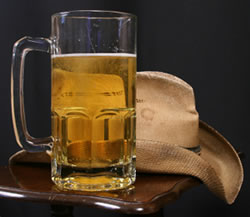 |
Texas has a long history in beer – both drinking and brewing. In addition to the long-standing Spoetzl Brewery (the makers of Shiner beers), and the ubiquitous (if watered down) Lone Star, new micro-brews are taking the state by storm. With solid traditional and inventive ales, newcomers like Saint Arnold and Real Ale Brewing Company are challenging the old hands to do better than what they’ve done. This battle seems to be playing out to the benefit of Texas beer fans.
The great history of Texas beer starts with the building of the massive Lone Star Brewery in San Antonio in 1884. Adolphus Busch, of Anheuser-Busch, started the enterprise along with some local San Antoners and created the first large mechanized brewery in Texas. But Lone Star beer came much later (1940), and the brewery first pumped out bottles of Sabinas and Champions.
While San Antonio was busy brewing for the local populace, a group of brewers in Shiner, Texas had big plans. This group started one of the most enduring breweries in the nation, Spoetzl Brewery. The brewery first started operations in 1909, and changed hands in 1914 with the coming of immigrant Kosmos Spoetzl. Spoetzl had studied for three years the art of brewing in Bavaria, and served out his journeyman-ship in Cairo, Egypt, making beer for the Pyramid brewery there. Making his traditional family recipe, Spoetzl garnered a following, and then prohibition hit. The brewery somehow managed to survive by selling ice and “near beer”, and weathered the storm from 1919 until 1935. Although prohibition was hardly enforced in Texas during this time, due to fierce controversy, it affected large breweries greatly, and Spoetzl was able to avoid much trouble by dealing strictly with locals in a 70 mile radius and selling his near beer. The Shiner website points out that Spoetzl was very forgetful, though, and sometimes would forget to remove the alcohol from his beers. Tsk, tsk.
Starting in 1994, Houston’s Saint Arnold Brewery opened their doors, and is widely acknowledged as Texas’ oldest craft brewery. Named after the patron saint of brewing, St. Arnold is a brewery that has always had a mind towards the utmost quality. With a hard working staff of only seventeen people, St. Arnold still pumps out ten varieties of beer every year – five varieties continuously, and five seasonally. Even though they’ve been in business for over 13 years, St. Arnold’s maintains it’s dedication to serving their local beer drinking community.
Other micro-breweries started popping up throughout Texas around this time. As early as 1993 in Austin, Texas, the Waterloo Brewpub began selling it’s beers in half-gallon growlers, fighting against laws that inhibited microbrewery operations. Sadly, this brewpub is now closed due to rent increases, depriving Austin of it’s first micro-brew-pub.
In 1996, the Real Ale brewing company opened up in Blanco, Texas, not too far from Austin in the hill country. Although Real Ale is not, by international standards, “Real Ale”, by U.S. beer standards, who can hold it against them? According to the U.K.’s CAMpaign for Real Ale, Real Ale can only be used when describing beer that is "brewed from traditional ingredients, matured by secondary fermentation in the container from which it is dispensed, and served without the use of extraneous carbon dioxide". Although the Real Ale Brewing Company uses the finest ingredients, it certainly cannot be held to CAMRA’s standards.
Possibly as a response to these breweries and others, such as 512 Brewing, Live Oak, Independence, and Rahr & Sons, all micro or craft breweries, Shiner has recently produced a small batch craft brew to celebrate 96 years of brewing. A little known style of beer called Martzen, the Shiner 96 is much stronger than most offering from the company, weighing in at 5.8%. Traditionally Martzen, which is German for March, is a beer brewed in march and enjoyed during the autumn months. According to the Shiner website, this ale was drunk at the royal Bavarian wedding ceremony that started the Oktoberfest celebrations.
It is good to see larger breweries getting back to their roots, and embracing the folk lore that is rightly their heritage. This seems to be a growing trend in brewing: brewers highlighting the social context and history of the beer they brew. Beers that get too big seem to lose their character – both taste-wise and lore-wise. Shiner is doing a good job of maintaining both. They just needed a little prodding from the (little guys) competition.


